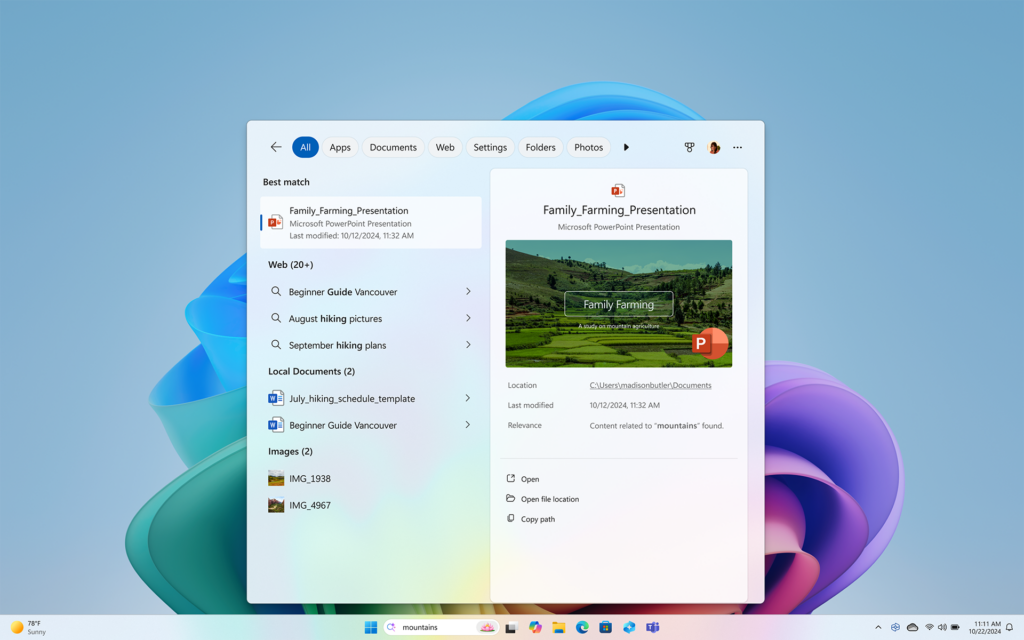Microsoft’s controversial Recall feature is now rolling out to Windows 11 Copilot+ PCs, along with an improved Windows search. Recall was delayed for months after the first implementation had significant security and privacy issues, but Microsoft has supposedly fixed all the problems.
Windows Copilot+ PCs have built-in NPUs and other hardware that can power local AI models, and Recall was built as the headline feature for the first wave of Copilot+ PCs. It’s a searchable timeline of everything you’re doing on your PC, using the context of everything on your screen through periodic automatic screenshots and scans, instead of just file metadata and connected databases.
Recall could be potentially useful, but the original implementation didn’t protect its databases of screenshots and scanned data, creating an easily-accessible treasure trove for malware and other dangerous software. It also wasn’t clear how much of your on-screen information would be sent to cloud services for processing, and if Recall would be enabled by default. The backlash was strong—to quote Douglas Adams, “This has made a lot of people very angry and been widely regarded as a bad move.”
Microsoft initially promised to fix all of Recall’s problems before the first Copilot+ PCs started shipping in June, but Microsoft delayed the update and turned off Recall on PCs. After a few more delays, the revamped version showed up in the Windows Insider Preview builds in November, and now it’s rolling out to the stable version of Windows 11 for Copilot+ PCs.
Windows Recall is Live
Microsoft said in a blog post today, “When we introduced Recall, we set out to address a common frustration: picking up where you left off. Whether it’s a project from last week or one of the countless browser tabs open while online shopping, tracking it down often means relying on vague memories while searching through folders, websites or endless emails. […] Recall retrieves your digital memory, allowing you to retrace your steps in seconds to quickly and securely find and get back to an app, website, image or document. Simply scroll through your timeline or describe the content you remember.”
Recall still works like it did when the feature was first released: it’s a timeline of your PC’s screen you can scroll through and search. However, Microsoft says it has implemented “extensive security considerations” since the first reveal. It now uses Windows Hello sign-in for accessing Recall, it’s opt-in by default, and Recall data is encrypted and isolated on your PC. Microsoft also says the data is “processed locally on your device, meaning it is not sent to the cloud and is not shared with Microsoft and Microsoft will not share your data with third parties.” Importantly, Recall is still only available on Copilot+ PCs, and it can be completely removed if desired.
Improved Windows Search
Microsoft is also rolling out the “improved Windows search” to Copilot+ PCs, which was first released in the Insider testing builds in January. It allows you to describe what you’re searching for in the File Explorer and Start menu, instead of being limited to file or folder names.
Microsoft explained in a blog post, “Improved Windows search can understand the contextual meaning of words or phrases, making search more natural and intuitive. This capability is made possible locally due to the 40+ TOPS (trillion operations per second) neural processing unit (NPU). Whether you’re using File Explorer, the Windows Search box or Settings, you can describe in your own words what images, documents or settings you are looking for, and improved Windows Search will comb through files and data to find it for you.”
Recall and other AI features are rolling out in Windows 11 build 26100.3915, so keep an eye on Windows Update if you have a Copilot+ PC.
Source: Windows Experience Blog, Microsoft Support





